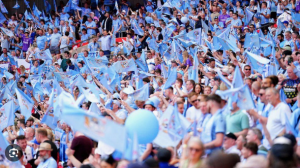Part one of exclusive interview with Coventry City assistant manager and head coach Adi Viveash as Mark Robins’ right-hand man lifts the lid on his time with the Sky Blues
Adi Viveash is, without doubt, an integral part of Coventry City’s success under Mark Robins – the club’s assistant manager and head coach; the man who ‘paints the pictures’ on the training pitch, according to the Sky Blues boss.
He can also be ‘difficult,’ by which Robins means he’s far from being a ‘yes’ man, which makes them a perfect partnership that has masterminded the club’s rise from League Two to the brink of the Premier League.

But what about the man behind the gruff exterior, the human side of City’s tough task master on the training pitch? Here, the highly decorated former Chelsea youth and development coach who won everything going at Stamford Bridge, opens up about his early days, a hard, working class upbringing and the personal tragedy in his life that helped shape the man he is today – a father figure to so many players as well as a brilliant coach.
The 54-year-old was interviewed by Sky Blues reporter Andy Turner to learn more about his path in football and life. He covered everything from his playing days to coaching top Premier League prospects and back to lower league seniors at Coventry. He opens up about what goes on in the locker room, the backstories of some of the most memorable games in the football league’s ascent to the championship, such as the thrilling play-off second leg triumph against Notts County, his near-ejection from the team, and his unique bond with the supporters.
I began by asking him how he went from a seemingly rugged center-half and master of the dark arts, mostly in the lower leagues, to an educator of the beautiful game. This is the first of three features; in the other two, he talks about tactics, formations, the evolution of individual players and the team as a whole, his relationship with the “gaffer,” and finding love.
To be honest, I was a little bit of both. Speaking exclusively to CoventryLive, he stated, “I knew the dark arts but I could also play and I was fortunate to have some good managers.”
“I developed my coaching mentality early on because I had Ossie Ardiles and Glenn Hoddle [as managers] while I was at Swindon. I was
“However, I was signed as a striker for my hometown Swindon and scored a lot of goals throughout my schoolboy years. However, for some reason, someone upstairs took away my early pace. Ossie told me, ‘You can see the game well,’ so he suggested I play at the back. After we laughed about it, I played there in an Everton preseason friendly in Ireland. We lost 2-0 despite their forwards, Norman Whiteside, Tony Cottee, and Mike Newell, but I did fairly well playing next to Colin Calderwood, who undoubtedly went on to play for Spurs.
He added: “I left Swindon when Steve McMahon was manager and went to Walsall. It was the time when you signed a contract but they could give you two weeks’ notice and you could give it to them. I could have gone to five places in the summer but the club blocked it and in the end it was November. My eldest son, who will be 30 this year, had just been born and he (McMahon) called me in one day and said they were letting me go, that it was a financial thing. “I was in a little bit of a mess, and actually thought I was going to go and do a football in the community role at Yeovil .
“Marshy was playing and I marked Kyle Lightbourne, who went to Cov, and I signed for a month. That turned into the end of the season and I ended up having five and a half years of probably the most enjoyable time of my career. We got promotion to the Championship – an incredible achievement to keep Man City in the play-offs and finish second behind Kevin Keegan’s Fulham. “Chris (Nicholl) really improved my defensive side because I was a ball playing centre-half, used to like left to right switches. The gaffer (Mark Robins) came that year when Ray Graydon was in charge, so I was fortunate to work under the calibre of managers I did.” He added: “Lou Macari was my first manager at Swindon
Leave a Reply